Iranians Angered As Man Throws Yogurt At Women Without Hijab

As regime supporters take the law into their own hands to combat the hijab rebellion, a man emptying a yogurt bucket onto the heads of two uncovered women has caused outrage in Iran.

As regime supporters take the law into their own hands to combat the hijab rebellion, a man emptying a yogurt bucket onto the heads of two uncovered women has caused outrage in Iran.
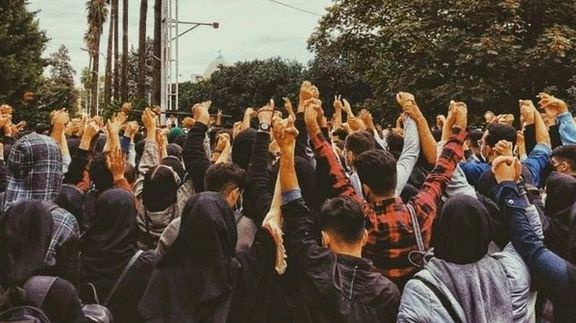
Six sculpture teachers at Tehran University of Arts have been dismissed for supporting nationwide protests against the Islamic Republic.
Mohammad Hossein Emad, Hamid Shans, Iman Afsarian, Pooya Arianpour, Bijan Ghonchepour and Rasoul Akbarlou, are among a wave of sackings and suspensions which come as crackdowns against uprising supporters continue across the country.
During the nationwide protests in Iran following the death in custody of Mahsa Amini, universities have been one of the main hubs of protests with hundreds of students being arrested, in addition to targeted poisoning attacks as the regime sought new means of suppressing unrest.
Meanwhile, in solidarity with their teachers, students at the institution have said they will boycott classes in protest while a number of fellow sculpture professors also supported the action by publishing a statement and refusing to teach.
Back in February, 120 students and graduates of Tehran University of Arts protested the suspension of professors by publishing an open letter. Addressing the dean of the University of Arts, they expressed anger over the suspension of two faculty members, Amir Maziar and Korush Golnari.
The regime continues to deny such dismissals and suspensions relating to the ongoing political unrest.Morteza Farrokhi, the Legal Deputy of Science Ministry stated in February that "if there are any cases of dismissal, it has been due to their academic incompetence."
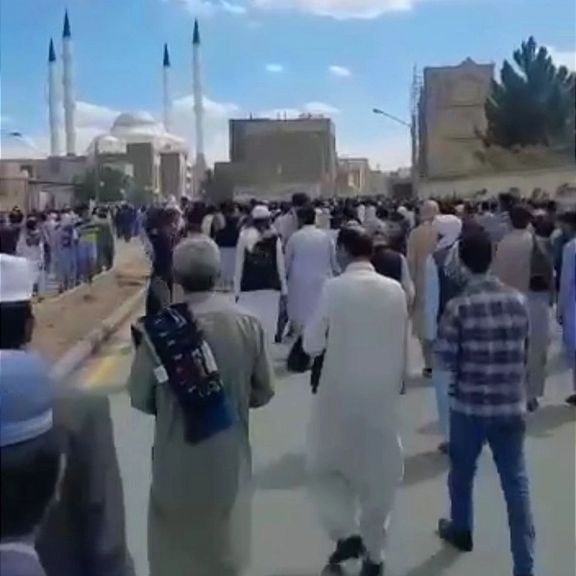
Friday was another weekend of protests in Iran’s Sunni majority Zahedan, with the city’s top cleric delivering another sermon on how the Islamic Republic failed to be a republic.
Amid another internet shutdown in the city, Mowlavi Abdolhamid talked about how the regime’s “religionism and ethnicism” have moved the country away from a true republican system in which people choose their representatives through elections.
The people of Zahedan have been protesting every Friday since September 30, when security forces opened fire on civilians, killing nearly 90 protesters.
He said that today people from all walks of life and different professions are protesting, while those who hold managerial posts are neither efficient nor experts and have no authority.
He referred to the anniversary of the referendum on creating the Islamic Republic-- held in Iran on 30 and 31 March 1979 – saying that people voted in favor of a republic to have a say in the important decisions of the country. “It (the referendum) was a beautiful and good opportunity for the government to use the capacity of Islam to spread the umbrella of equality for all citizens of Iran, both men and women and religious and non-religious," he said, noting that Islamic governance did not spread equally on all people and many atrocities were committed against different minorities.
During more than 40 years of clerical rule, the religious people who were openminded were sidelined, let alone the non-religious people, he said, noting that those in power are the ones who only pretend to be religious.
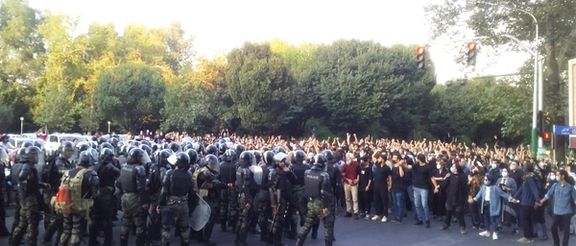
A group of former and incumbent diplomats as well as rights activists have established a Jewish Committee to support ‘Woman, Life, Freedom’ movement in Iran.
The group, which announced its establishment on Friday, said that its mission is “to connect the American Jewish community with the Iranian diaspora to support their efforts to amplify the voices, vision, and dreams of the Iranian people in Western capitals.”
The Jewish Committee also says it will promote grassroots support for the Iranian diaspora protesters and will also be raising funds within the American Jewish community to offer microgrants to support protest activities around the world.
“The history of organized American Jewry has reflected the core Judaic values of justice, respect, community, and repairing the world... Those same Judaic values inspire the creation of a committee to support the Woman Life Freedom movement and the people of Iran who face death and torture in the cause of freedom,” the groups added.
Several former US senators and representatives such as Joseph Lieberman, Norm Coleman, Eric Fingerhut, and Ted Deutch as well as two former US ambassadors to the UN, Mark D. Wallace and Dennis Ross, are among the nearly 20 founding members of the committee.
“With governments, news media, and activists distracted by global events, there has been inadequate support for the Iranian people in the face of the brutal human rights abuses by the Iranian regime," the committee underlined. “It is critical to recognize this historic movement in Iran and to help sustain its momentum."
The US is home to 60-80,000 Iranian Jews, the second largest diaspora community after Israel, home to around 250,000, most of whom fled in the years following the revolution. Just 10,000 Jews remain in Iran today.
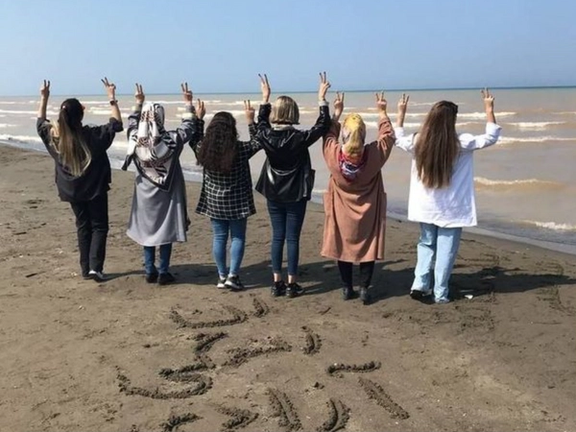
Since Mahsa Amini was beaten to death by hijab enforcers in September, sparking nationwide revolt, the simple act of unveiling in public has been a thorn in the side of the regime.
Despite numerous new measures to curb the trend, more women are daring to be seen without headscarves on streets, in public buildings, and on social media, shaking the foundations of the theocratic dictatorship to the core.
Life after the Mahsa Amini incident will never be the same. For many, the hijab has gone for good but the country’s hardliners will not relent in their battle.
In a determined statement on Thursday, the Islamic Republic’s Interior Ministry described the hijab as "one of the foundations of the civilization of the Iranian nation" and "one of the practical principles of the Islamic Republic.”
"There has not been and will not be any retreat or tolerance in religious principles and rules and traditional values, and hijab, as an unquestionable religious necessity, will always be one of the practical principles of the Islamic Republic of Iran," read the statement.
But, never have Iranians been forced to cover their hair throughout their millennia-old culture, and the Islamic Republic – along with Taliban Islamist extremist group in Afghanistan — is the only Muslim country with such a strict interpretation of hijab and nationwide coercive measures for its observance.
The unrest created since the death in morality police custody of 22-year-old Mahsa Amini has made it increasingly difficult to enforce the mandatory Islamic dress code which has become a symbol of revolution.
The tide against the hijab was never as strong as it is today. Anti-hijab campaigns such as ‘White Wednesdays’, ‘Girls of Enghelab Street’, ‘No to Mandatory Hijab’, and ‘Sneaky Freedoms’, have been branded plots by “the enemy” to disrupt the idea in the minds of Iranian women.
The mere existence of so many campaigns against the obligatory dress code is indicative of its low popularity among the people.
In addition to the regime suggesting that the anti-hijab movement is "one of the axes of the enemies’ cognitive war against the nation”, the Interior Ministry has also called the “Women, Life, Liberty” -- the main motto of the current wave of anti-regime protests – a “demagogic slogan” devised by the intelligence agencies of adversaries to conceal their evil intentions.

The conspiratorial statement - typical of the regime rhetoric - claimed that the schemes of the movement have been foiled but the people but did not explain that if such is the case, why the Islamic Republic has been intensifying measures to enforce hijab. Workshops and seminars are being pushed on women to quash the female-led uprising against the regime’s hackneyed propaganda lines.
The ministry has also incited numerous clashes as it urged organizations as well as ordinary citizens to confront women who unveil in public, emboldening the hardliners to attack women and girls with loose-fitting hijab in public because they know the authorities will back them in courts if the rows lead to judicial cases.
Earlier in the week, it was announced that women could be fined as much as $60,000 for flouting hijab observance when a new law to enforce the Islamic dress code is passed by parliament.
These penalties will apply to passengers who do not abide by the hijab rules everywhere from in private vehicles to schools, restaurants and even in cyberspace. Nobody is above the law either, celebrity or otherwise, said lawmaker Hossein Jalali.
As surveillance intensifies, the regime also plans to use CCTV cameras and facial recognition technology to identify women who flout the hijab, and use cash fines and social restrictions to punish them including blocking their bank account and banning them from internet access or using governmental services.
Since the death of Mahsa Amini, the morality police may have had to step back from public life somewhat, but the swell of rebellion remains a bitter pill for the regime to swallow as they seek new means of oppression.
Four decades after the Islamic Republic forced women to wear headscarves, it is clear that change is afoot. Who knows what will be in the near future, but the tide has turned and no matter the levels of oppression and surveillance, there is no doubt there is no going back. The regime is fighting a losing battle and it has lost the hearts and minds of its people.
Women are prepared to sacrifice their lives to ensure the futures of the next generation and we are witnessing a resilience even the tools of dictatorship seem unable to quash.
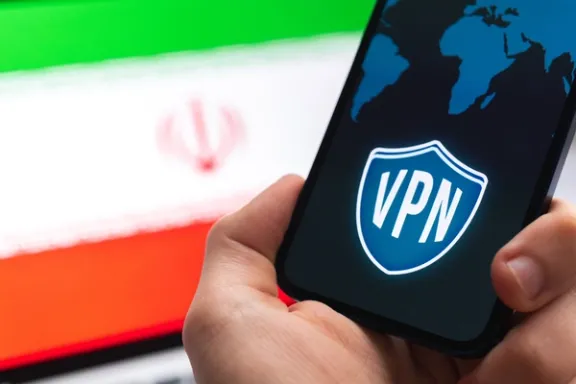
If you live in Iran, you are likely to need not one, but several virtual private networks (VPNs) just to be able to make a simple WhatsApp call or check your Instagram.
Millions of Iranians circumnavigate internet restrictions imposed by the government by purchasing VPNs or downloading them from the internet on their phones and computers. Those that are for free often do not work, but quite often the paid VPNs also fail to work as the authorities continuously identify and block them. Such restrictions have hugely increased since anti-government protests that ensued after the death of the 22-year-old Mahsa Amini in ‘morality police’ custody in late September.
DATA.AI’s map application rankings and store data indicate that five of the top applications used by Iranians and downloaded from Google Play belong to the VPN category with the rest consisting of communications and social media applications including WhatsApp, Telegram, Instagram, Twitter and YouTube all of which are blocked.
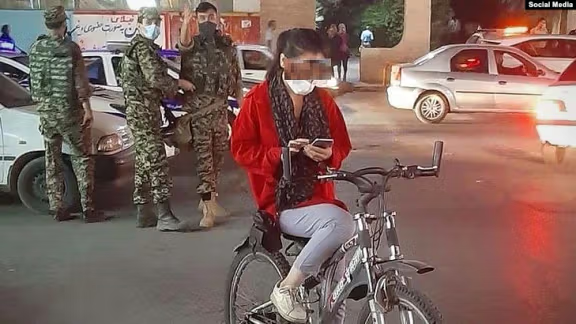
Google also said in October there was a spike in demand from Iran for its Jigsaw subsidiary's open-source Outline tool which allows third parties to set up secure VPNs resistant to disruption and censorship efforts.
Currently Google Play, where users could download VPNs, and occasionally Google Maps, Google Chat and Google Meet also become unavailable depending on the type of VPN one has installed on their devices.
“Only with a proxy [server] and with difficulty I can open my Telegram to download configurations that let me open Instagram and WhatsApp. I need another anti-filtering software for Twitter and heavy applications that have to be downloaded from Google Play which is also blocked,” a twitter user wrote Tuesday, and damned the Islamic Republic for making online access so difficult.
This viral video on Instagram shows a monkey hitting his phone angrily and swearing for not being able to connect to any of the “100s of VPNs” installed on the phone
"Daily demand for virtual private network (VPN) services in Iran is up over 3,000% compared to before the protests," Simon Migliano, the head of research at Top10VPN, told Axios in October.
Government restrictions were meant to stop people from sharing news and images of the protests that could motivate a larger segment of the population to join in. There are much fewer protests now, but the use of VPNs appears to have continued to grow as the government keeps its hold on the flow of information.
In January, the judiciary and the ministry of communications said they would take legal action against "unauthorized” providers of VPNs and internet circumvention tools.
By blocking access to applications such as WhatsApp and VPNs that make access to them possible, authorities are trying to force Iranians to use domestically-developed applications such as Soroush, Eitta, and Bale but many Iranians do not trust these applications which they say the government can control and use for spying on them.
Many VPNs are not safe, either. In January, Bitdefender, a private cybersecurity company, revealed information about an Iranian spyware that stole users’ sensitive information through a VPN software.
Extensive filtering has highly damaged internet-based businesses and around 10 million whose livelihoods depends on selling their products and services by advertising on social media. Small businesses, particularly those run from homes by women or small farms in rural areas whose numbers exponentially grew after the Covid pandemic, very heavily relied on Instagram for advertising and WhatsApp for communication with potential customers.
Officials, including Supreme Leader Ali Khamenei, have repeatedly criticized free access to the internet in recent years, and have been trying to prevent the free flow of information by expanding the National Information Network (NIN), a national intranet.
The shocking video shows a man in the north eastern city of Shandiz assaulting the mother and daughter for not wearing the mandatory hijab.
Several men responded and threw the aggressor out of the store after a scuffle broke out.
It comes in the wake of calls by the regime for the public to take matters into their own hands to quash the new wave of women abandoning the Islamic headscarf around the country.
Mohammad Reza Shahrokhi, the representative of Supreme Leader Ali Khamenei in Lorestan province recently reiterated the hijab law, inciting yet more violence as he urged the “revolutionary youths and clerics” to deal with the "norm breakers”. On Friday more clerics made provocative statement about enforcing hijab, while on Saturday the head of the Judiciary threatened harsh measures.
In a determined statement on Thursday, the Islamic Republic’s Interior Ministry described the hijab as "one of the foundations of the civilization of the Iranian nation" and "one of the practical principles of the Islamic Republic.”
Iran’s Chief Justice Gholamhossein Mohseni Ejei this week reiterated threats against those daring to uncover. He warned women will be “prosecuted without mercy,” he said, without saying what the punishment entails.
Following the death in custody of Mahsa Amini, arrested for not wearing the hijab in a proper manner, women are increasingly appearing in public and on social media without the headscarf, with many burning it in public protest.